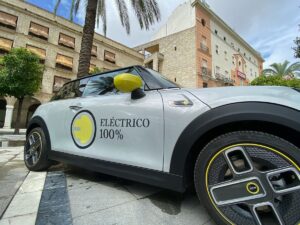
Home / EV Charging News / Electric Cars and Sustainable Transportation Policies
In the pursuit of a more sustainable future, governments worldwide are turning their attention to electric vehicles (EVs) as a key player in reshaping transportation. This article explores the pivotal role of government policies in promoting electric vehicle adoption and steering the course toward sustainable transportation initiatives.
One of the cornerstone strategies employed by governments is the provision of financial incentives and subsidies to encourage the purchase of electric vehicles. These can take the form of tax credits, rebates, or direct financial assistance, making EVs more economically appealing to consumers.
To support the growth of electric vehicles, governments often offer rebates or grants to businesses and individuals investing in charging infrastructure. This approach not only incentivizes the expansion of charging networks but also addresses range anxiety, a common concern among potential EV adopters.
Governments are setting stringent emission standards and Zero-Emission Vehicle (ZEV) mandates to accelerate the transition to cleaner transportation. By imposing regulations that require automakers to produce a certain percentage of electric vehicles, authorities actively contribute to reducing overall carbon emissions from the transportation sector.
Granting electric vehicle owners access to High-Occupancy Vehicle (HOV) lanes, regardless of the number of occupants, serves as an additional perk. This not only provides a tangible benefit to EV owners but also acts as an incentive for others to make the switch to electric.
Recognizing the importance of a robust charging infrastructure, governments are allocating funds for the development of public charging stations. These investments aim to eliminate range anxiety, enhance the convenience of EV ownership, and promote the widespread adoption of electric vehicles.
Some governments are taking a proactive approach by mandating the inclusion of charging infrastructure in new developments. This requirement ensures that residential and commercial spaces are equipped to support electric vehicle ownership from the outset, contributing to a more EV-friendly environment.
In the realm of electric vehicles, international collaboration is becoming increasingly vital. Harmonizing standards and regulations across borders facilitates a more seamless global transition to sustainable transportation, ensuring that EVs can operate efficiently and safely regardless of location.
Governments are pooling resources and expertise through shared research initiatives. Collaborative efforts in areas such as battery technology, smart grids, and renewable energy integration contribute to the collective knowledge base, accelerating advancements in electric vehicle technology and sustainability.
Governments recognize that addressing range anxiety is paramount for widespread EV adoption. Investments in battery technology, including research and development, aim to extend the range of electric vehicles, making them more comparable to traditional vehicles in terms of distance coverage.
To combat range anxiety, governments are actively expanding fast-charging networks along highways and in urban areas. The goal is to create a network of charging stations that provides convenient access for electric vehicle owners, encouraging long-distance travel and easing concerns about running out of battery power.
Affordability remains a key consideration for potential EV buyers. Governments are addressing this challenge by providing subsidies for EV purchases, making electric vehicles more accessible to a broader range of consumers and leveling the playing field with traditional vehicles.
Recognizing the importance of the second-hand market, some governments are extending their support to the sale and purchase of used electric vehicles. This initiative not only increases the affordability of EVs but also reduces overall environmental impact by extending the lifespan of electric vehicles.
Governments are exploring ways to electrify public transportation, from buses to trains. Electrifying public transit not only reduces emissions but also sets an example for sustainable mobility. Initiatives include the integration of electric buses into fleets and the electrification of rail networks.
Governments are adopting multimodal transportation planning strategies that incorporate electric vehicles seamlessly into the overall transportation network. This approach aims to create a cohesive and efficient system where different modes of transport complement each other, reducing congestion and environmental impact.
To drive continuous innovation in electric vehicle technology, governments are offering incentives for research and development. This includes funding for initiatives focused on improving battery efficiency, enhancing charging technology, and exploring new avenues for sustainable transportation.
Governments are actively supporting emerging technologies, such as autonomous electric vehicles and vehicle-to-grid (V2G) integration. These innovations have the potential to further revolutionize transportation, making it not only sustainable but also more efficient and technologically advanced.
Governments are investing in outreach programs to educate the public about the benefits of electric vehicles and sustainable transportation. These initiatives aim to dispel myths, address misconceptions, and empower consumers with the knowledge needed to make informed choices about transitioning to electric vehicles.
Collaborations between governments and non-profit organizations dedicated to environmental causes are becoming more prevalent. These partnerships amplify the reach of sustainability messages, fostering a sense of collective responsibility and encouraging individuals to actively participate in the shift towards sustainable transportation.
Governments are exploring tax credits and incentives for individuals and businesses that install private charging stations. This approach not only encourages the expansion of charging infrastructure but also promotes a decentralized network, reducing strain on public charging stations and further supporting electric vehicle adoption.
Public-private partnerships play a key role in the development of comprehensive charging networks. Governments are collaborating with private entities to establish a network of charging stations in strategic locations, ensuring that electric vehicle users have convenient access to reliable charging infrastructure.
Governments are leading by example by incorporating electric vehicles into their own fleets. Green procurement policies mandate the inclusion of electric vehicles in government vehicle purchases, promoting the adoption of sustainable practices and showcasing the viability of electric vehicles for various use cases.
To encourage businesses to adopt electric vehicles, governments are introducing tax incentives for companies that incorporate electric vehicles into their corporate fleets. These incentives contribute to a greener corporate culture and support the widespread adoption of electric vehicles in the business sector.
Governments are allocating significant funds to support research and development in battery technology. These investments aim to accelerate breakthroughs that enhance the energy density, longevity, and affordability of batteries, addressing key challenges and driving the widespread adoption of electric vehicles.
The development of solid-state batteries represents a promising frontier in electric vehicle technology. Governments are supporting initiatives focused on solid-state battery research, as these batteries have the potential to overcome limitations associated with traditional lithium-ion batteries, such as faster charging times and increased safety.
Smart grids play a crucial role in optimizing the integration of electric vehicles into the energy ecosystem. Governments are investing in smart grid infrastructure to enable seamless communication between electric vehicles and the grid, ensuring efficient charging, demand response, and overall grid stability.
Vehicle-to-Grid (V2G) technology continues to evolve, driven by government support and industry innovation. Advanced V2G systems enable bidirectional energy flow between electric vehicles and the grid, offering enhanced grid services, load balancing, and additional revenue streams for electric vehicle owners.
Governments are actively participating in international efforts to standardize charging infrastructure. Harmonizing charging standards facilitates cross-border travel for electric vehicle owners and promotes a consistent charging experience globally, contributing to the international expansion of electric mobility.
Global climate agreements set ambitious targets for reducing greenhouse gas emissions, prompting governments to prioritize sustainable transportation. By aligning transportation policies with international climate goals, governments contribute to a collective effort to mitigate climate change and transition to a low-carbon future.
In conclusion, the role of government policies in fostering sustainable transportation extends beyond incentives and regulations. By actively engaging the public, incentivizing charging infrastructure expansion, and investing in technological advancements, governments play a multifaceted role in shaping a future where electric vehicles are the cornerstone of sustainable mobility.
As international collaboration continues to gain momentum, the collective efforts of governments worldwide are propelling us towards a future where clean, efficient, and accessible transportation is not just a vision but a reality. Through ongoing public-private partnerships, technological breakthroughs, and a shared commitment to environmental stewardship, the global community is charting a greener path for tomorrow’s roads—one where electric cars lead the way towards a sustainable and resilient transportation landscape.
$2,890.00 Original price was: $2,890.00.$2,690.00Current price is: $2,690.00.
$4,150.00 Original price was: $4,150.00.$3,790.00Current price is: $3,790.00.
$1,650.00 Original price was: $1,650.00.$1,490.00Current price is: $1,490.00.
$2,290.00 Original price was: $2,290.00.$2,150.00Current price is: $2,150.00.
$1,290.00 Original price was: $1,290.00.$799.00Current price is: $799.00.
$10,690.00 – $11,390.00




Your Power Management Partner for Over 25 Years Future Generations Depend on Our Decisions Today ™
2024 © All rights reserved by CyberSwitching